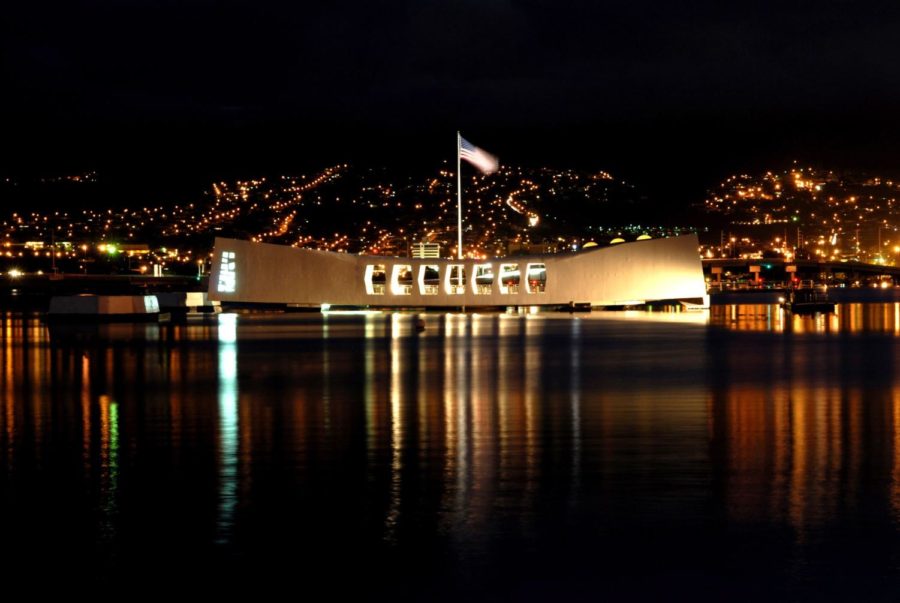Brown: Deceit and destruction
December 8, 2021
“December 7, 1941 — a date which will live in infamy — the United States of America was suddenly and deliberately attacked by naval and air forces of the Empire of Japan.” You hear bits of this famous radio address every year around this time. Suicide pilots — later called “kamikazes” — flew to O’ahu with enough fuel for a one-way trip and destroyed many ships and killed many men. What you don’t usually hear is a reminder that the folks in charge of the U.S. government at the time knew it was going to happen.
The government of the United States has been complicit in many terrible things. The folks in charge usually wait many decades before declassifying all the documents. Roosevelt knew three days before the attack that Japan was focusing on Hawai’i. The official narrative of National Public Radio is that everyone was blindsided. Having seen the deceit of U.S. government agents firsthand in the Navy, I scoff at such naïve trust.
Would it surprise you to know that the bombing of Pearl Harbor was an answer to many men’s prayers? The McCollum memo, which you can read for yourself, includes a high-ranking military officer’s suggestions to the president. How could we get Americans, who before 1941 were staunchly anti-war, to support open involvement in the second World War? McCollum offered eight ideas on how to get Japan to attack us and provoke American wrath. “If by these means Japan could be led to commit an overt act of war, so much the better,” he commented. Thanks to Robert Stinnett, this memo was declassified in 1994 and you can see photographs of it.
Stinnett worked to uncover the truth about Pearl Harbor. In his heavily criticized book, “Day of Deceit,” the former sailor claims that FDR knew about the attack before it happened. FDR was a tyrant who greatly expanded the power of the state until he died in office, but I like to give everyone the benefit of the doubt. So, I am not ready to promote that FDR precisely knew everything hours beforehand. But he certainly expected Japan to attack. Why not, when he had implemented every single recommendation on McCollum’s memo within a year?
Despite claiming to remain neutral during the first couple years of WWII, the United States government had actually been aggressive in the Pacific. If somebody were to put ships off the coast of the United States and threaten vessels should they trade with anyone, would you call that “neutrality”? That is what we did with Japan. “Crippling of Japan in Six Months By British-U.S. Blockade Is Seen,” reads a New York Times article, optimistic about Britain and the U.S. teaming up against Japan. “When goods don’t cross borders, soldiers will,” goes the maxim.
FDR got what he wanted: an attack by Japan on American citizens and troop in the U.S. Territory of Hawai’i. “I have said this before, but I shall say it again and again and again: Your boys are not going to be sent into any foreign wars,” Roosevelt assured the American people when running for re-election in 1940. People at that time realized how the U.S. involvement in the first World War did not make the world a better place. Roosevelt comforted Americans with campaign-trail lies. He sent his most trusted advisor to Britain to meet with Winston Churchill. He relayed an important message in 1941: “Make no mistake about it. He has sent me here to tell you that at all costs and by all means he will carry you through, no matter what happens to him — there is nothing he will not do so far as he has human power.”
Did the American government know ahead of time? Shortly before the attack on Pearl Harbor, the Red Cross had extra resources allocated for Honolulu. More evidence comes out every few years. One week before Pearl Harbor, a local newspaper warned at the top, “Japanese May Strike Over Weekend!” People knew, but the few who did were honor-bound to keep their oaths of silence or felt a patriotic duty to keep their portion of knowledge secret. According to James Perloff, just two months before the great attack, “the War Department decoded a Tokyo-to-Honolulu dispatch instructing the Consul General to divide Pearl Harbor into five specified areas and to report the exact locations of American ships therein.” Another message decoded by the U.S. gave another hint about the attack to come: “To prevent U.S. becoming unduly suspicious press has been advised negotiations are continuing.” These decoded messages were seen only by top officials under after America had entered the war.
The men who bombed Pearl Harbor chose to do what they did. Blinded by patriotism for Japan and idolatry of the Emperor, the Japanese were willing to do many terrible things. Americans were likewise blind to the evils of its rulers. It is time to recognize things for what they are. It was wrong to let thousands die in Pearl Harbor. We were wrong to imprison civilians of Japanese descent shortly thereafter. We like to call the prisons “camps” because it sounds like picnic time: “internment camps.” How about we call them “concentration camps” since we are concentrating so many people in such small camps? We aren’t ready to admit that of our ancestors, are we?
Are we ready to admit that the Japanese civilians of Hiroshima and Nagasaki did not need to be vaporized? Former president Eisenhower knew, “the Japanese were ready to surrender and it wasn’t necessary to hit them with that awful thing.” Former president Hoover likewise said, “The use of the atomic bomb, with its indiscriminate killing of women and children, revolts my soul.” Not all of America’s past leaders were as wicked as others, you see. It is important for us to learn from history and not repeat its mistakes.







